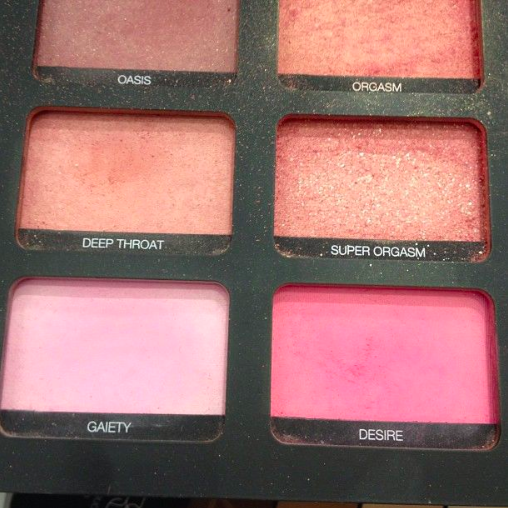Makeup Brands “Oversexualize” Names of Products

Makeup brand NARS gives suggestive titles to different shades of a blush palette.
April 19, 2016
It’s getting a little too hot in here.
It’s no secret—makeup brands have been giving their lipsticks and eyeshadows unnecessarily suggestive names like Urban Decay’s “Perversion” and NARS’ “Orgasm” for years.
In March, leading drugstore cosmetic brand Rimmel London released a new line of lipsticks, bearing the name ProvocoLips, with pieces sporting names like “Naughty Nude.” Despite numerous Rimmel ads campaigning for “revolutionary” usage of lipsticks, it seems like it’s the same old thing—brands give their products unnecessarily suggestive titles, and it needs to stop.
Whether it’s because the cosmetic companies believe that the names sound sexy and boost sales or because the names just sound appealing, it’s time to stop “oversexualizing” the names of makeup items. Doing so is demeaning towards women and only furthers the idea of viewing females as sexual objects.
Even the way makeup quality is measured has been sexualized. Lip products that are waterproof and smudge-proof are deemed “kissproof” in order to seem more appealing. Rather than just stating that the product is smudge or water proof, it’s clear that brands believe the quality must be associated with some romantic act in order to sell.
According to a NARS blog, makeup names like “Super Orgasm” are used in order to make the brand seem edgy and more appealing to women who are interested in looking sexier.
While that’s all well and good, the issue arises when names become too suggestive. There’s nothing wrong with a woman wanting to look a certain way if she chooses to. However, it is disturbing to hear a beauty guru in a video cheerfully announce that she is putting on a NARS blush called “Deep Throat.”
Women are already regularly subjected to “oversexualization” in the media, whether it be in car commercials or ads for running shoes. Makeup, however, shouldn’t be the same way.
Though cosmetics is an industry that focuses on appearances, in truth, makeup is a tool and hobby that encourages women to increase their self-confidence. It’s not necessarily used to “change” one’s face or make someone look completely different.
According to a study by academia.edu, women wear makeup to feel more powerful and more confident.
If the purpose is to boost self-esteem, then the products used to achieve that goal should inspire positivity rather than sexiness. The industry shouldn’t be furthering the stereotype that women only put on makeup to make themselves “look good” for others, or because they need to hide imperfections.
This is beside the fact that sexualized makeup names are being sold to increasingly younger customers.
According to an April 2010 Huffington Post article, makeup use among “tween” girls is rising. From 2007 to 2009, the percentage of girls aged eight to 12 using mascara and eyeliner doubled.
If cosmetics are being sold to more and more impressionable young girls, then the fact that there are products like Too Faced’s “Better than Sex” mascara is ridiculous. While the product may be wonderful, its name is completely unnecessary. Using products similarly named leads young girls to believe that cosmetics should be associated with achieving ultimate sexual appeal before self-confidence.
The cosmetics industry is marketed towards women, who shouldn’t have to feel psychologically condemned by their makeup’s names, making them feel that they have to use makeup to look different or sexy unless they want to.
All forms of media need to battle the unnecessary sexualization of women that makes them look constantly obsessed with their outer image and take steps towards promoting female empowerment instead.

